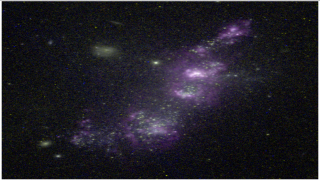Bibcode
Hernán-Caballero, A.; Alonso-Herrero, Almudena; Pérez-González, Pablo G.; Barro, Guillermo; Aird, James; Ferreras, Ignacio; Cava, Antonio; Cardiel, Nicolás; Esquej, Pilar; Gallego, Jesús; Nandra, Kirpal; Rodríguez-Zaurín, J.
Referencia bibliográfica
Monthly Notices of the Royal Astronomical Society, Volume 443, Issue 4, p.3538-3549
Fecha de publicación:
10
2014
Número de citas
17
Número de citas referidas
16
Descripción
We analyse the stellar populations in the host galaxies of 53 X-ray
selected optically dull active galactic nuclei (AGN) at 0.34 < z <
1.07 with ultradeep (mAB = 26.5, 3σ) optical
medium-band (R ˜ 50) photometry from the Survey for High-z
Absorption Red and Dead Sources (SHARDS). The spectral resolution of
SHARDS allows us to consistently measure the strength of the 4000
Å break, Dn(4000), a reliable age indicator for stellar
populations. We confirm that most X-ray selected moderate-luminosity AGN
(LX < 1044 erg s-1) are hosted by
massive galaxies (typically M* >1010.5
M⊙) and that the observed fraction of galaxies hosting an
AGN increases with the stellar mass. A careful selection of random
control samples of inactive galaxies allows us to remove the stellar
mass and redshift dependences of the AGN fraction to explore trends with
several stellar age indicators. We find no significant differences in
the distribution of the rest-frame U - V colour for AGN hosts and
inactive galaxies, in agreement with previous results. However, we find
significantly shallower 4000 Å breaks in AGN hosts, indicative of
younger stellar populations. With the help of a model-independent
determination of the extinction, we obtain extinction-corrected U - V
colours and light-weighted average stellar ages. We find that AGN hosts
have younger stellar populations and higher extinction compared to
inactive galaxies with the same stellar mass and at the same redshift.
We find a highly significant excess of AGN hosts with
Dn(4000) ˜ 1.4 and light-weighted average stellar ages
of 300-500 Myr, as well as a deficit of AGN in intrinsic red galaxies.
We interpret failure in recognizing these trends in previous studies as
a consequence of the balancing effect in observed colours of the
age-extinction degeneracy.
Proyectos relacionados

Grupo de Estudios de Formación Estelar GEFE
El proyecto interno GEFE está enmarcado en el proyecto coordinado, ESTALLIDOS, financiado por el plan nacional desde el año 2001. El ultimo proyecto aprobado es ESTALLIDOS 6.0 (AYA2016- 79724-C4-2-P). En el proyecto GEFE trabajamos en base al caso científico del proyecto ESTALLIDOS 6.0. Los estallidos de formación estelar (Starbursts o SB) son
Casiana
Muñoz Tuñón